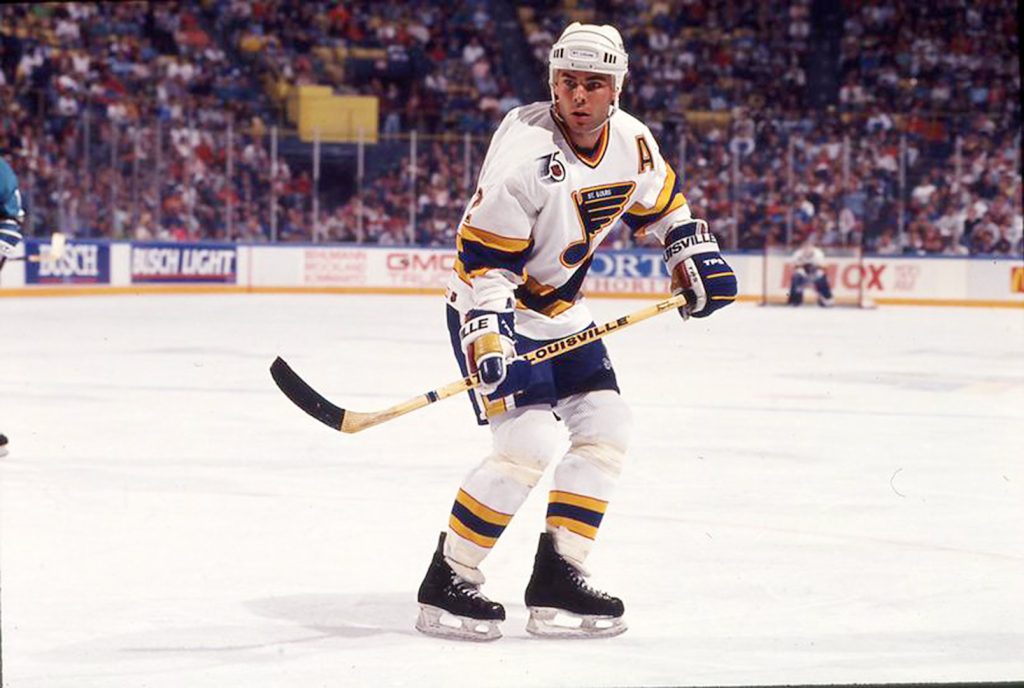Hall of Fame
Inductees
Legend
Adam Oates
Class of 2016
Summary

Biography
Adam Oates earned his place in the Hockey Hall of Fame in large part by assisting on teammates’ goals. So it follows that once his playing career ended, Oates would decide to help the next generation of players achieve their goals on the ice.
The playmaking centre from Weston tallied 1,079 assists and 341 goals in 1,337 National Hockey League games. Oates played for seven teams over 19 seasons, combining a gift for perfect passes with solid leadership in the dressing room. His accomplishments are even more impressive considering he was never drafted.
Oates was one of three children born to David and Loretta Oates. As a youngster, his true passion was lacrosse. He was a star with the Etobicoke Eclipse of the Ontario Lacrosse Association, but after one season of senior A Major Series Lacrosse, Oates decided to devote his efforts to hockey.
He left high school and joined the junior A Markham Waxers at age 19, pumping gas to support himself. Oates lit up junior A, but scouts passed on the playmaker, considering him too slow for the NHL. Oates was determined to prove them wrong, even if he wasn’t sure how. “I was a little bit of a cocky kid, thinking that I would figure out a way to get there,” he said.
Paul Allen, assistant hockey coach at Rensselaer Polytechnic Institute in Troy, NY, recruited the talented forward while scouting a different Waxers player. Oates led the RPI Engineers in assists for three seasons, being named an NCAA All-American in 1984 and 1985 and helping RPI win the 1985 national championship. At the urging of RPI head coach Mike Addesa, Oates completed his high school diploma. His strong showing with the Engineers finally caught the eye of the scouts, and he signed with the Detroit Red Wings.
As the highest-paid rookie in the NHL, much was expected of Oates. The 23-year-old started strong, netting his first goal and assist in his first game, on October 10, 1985, against the Minnesota North Stars. He endured the inevitable first-year struggles and split time between Detroit and Adirondack, winning a Calder Cup with the AHL Red Wings. Over the next three seasons Oates established himself as a solid contributor, but he was shipped to St. Louis after the Red Wings bowed out of the 1988–89 playoffs in the first round.
Oates was said to have been “heartbroken” to leave the club that had signed him, an emotion Red Wings executives might have echoed as they saw their former prospect blossom into a superstar. With sniper Brett Hull on his wing, Oates quickly cemented his reputation as a hardworking two-way centre. Playing on the top line, “Hull and Oates” became a feared offensive combination, with Oates recording 102 and 115 assists in his first two seasons with St. Louis. Many of those passes ended up in the net courtesy of Hull, who scored 72 and then 86 goals. “It was just fantastic,” Oates said. “I can’t believe we only played together two and half years, because it felt like 10. It was just so special. We just really hit it off as buddies, friends. We played the game the same way; the chemistry was just excellent.”
Oates played in the 1991 all-star game, his first of five all-star nods. He acclimatized quickly to life in Boston after a trade to the Bruins, posting his best season in 1992–93, when he led the league with 97 assists and tallying 142 points. Feeding pass after pass to winger Cam Neely, Oates’ 112 points the following season were good for third in the league. Oates recorded his 1,000th career point in style, with a hat trick and two assists on October 7, 1997. Traded to Washington in mid-season, Oates propelled the Capitals to the Stanley Cup final, where they lost to Detroit.
As Washington captain, Oates led the league in assists at ages 38 and 39 while providing veteran leadership. His tour of the league continued when he was traded to the Philadelphia Flyers in 2002. He signed with Anaheim the following year—leading the Ducks with 13 playoff points in a hard-fought Stanley Cup final loss to New Jersey—and finished his career with a season in Edmonton. “There were a lot of good things that happened to me everywhere I went,” said the journeyman centre.
When Oates retired, his 1,079 assists ranked fifth all time. He credits his father, David, with encouraging his son’s unselfish play by pointing to British soccer star Stanley Matthews—known as a pass-first player—as an example to follow. “It was just kind of our family story growing up—‘if you can be unselfish, your teammates will always like you,’” Oates said.
His teammates did indeed appreciate Oates’ generosity. “He doesn’t get as much publicity as the goal scorers, but he loves to watch you put the puck in the net. I never asked him why he didn’t want to score more himself; I was afraid he’d change his mind,” quipped Hull.
Boston defenceman Ray Bourque agreed that Oates was underrated. “I think a lot of people take what he does for granted,” Bourque said. “He does it in a quiet way. He’s not a flashy guy. He’s not looking for attention, he just goes out and does it. He’s the best centerman I’ve been around.”
Oates could also find the back of the net when the situation arose. He reached the 20-goal mark five times and scored 45 goals in 1992–93, including a league-best 11 game-winners. He was a presence on the power play, scoring 103 of his 341 career goals with the man advantage, and knew how to rise to the occasion, with 42 goals and 114 assists (156 points) in 163 playoff games. He was also a six-time finalist for the Lady Byng Memorial Trophy, awarded for high levels of sportsmanship and ability.
Six years after he retired, Oates was behind the bench as an assistant coach with the Tampa Bay Lightning. Under Oates’ tutelage, Steven Stamkos matured into a more complete player and the team’s power play improved to ninth-best in the league. Oates became an assistant in New Jersey the following year, helping the Devils reach the Stanley Cup final in 2012. “He did an outstanding job for us,” then-Devils general manager Lou Lamoriello said of Oates. “He’s very communicative, very intelligent, he explains things very well.” Oates’ positive attitude resonated with players like Scott Gomez, who called Oates the best coach he ever played for. “(Oates is) one of the only coaches I’ve seen where, whether you were on the first or fourth line, every day he would try to make you better.”
June 26, 2012, proved a fateful day for Oates, as he was elected to the Hockey Hall of Fame and hired to be the head coach of the Washington Capitals. After a moribund start to the lockout-shortened 2012–13 season, Oates took his charges from worst to first in the Southeast Division. The Capitals lost a hard-fought playoff round to the Rangers in seven games. When Washington missed the post-season the following year, Oates was fired along with general manager George McPhee. Lamoriello brought Oates back to New Jersey in December 2014 for a brief experiment in co-coaching with Scott Stevens.
These days Oates remains active in hockey as a private skills coach, working with Optimal Player Performance and My Pro Hero to train the next generation. Stamkos, Zach Parise, Alex Ovechkin, Teddy Purcell and Max Pacioretty are just a few of the NHL players who have benefitted from Oates’ experience, attention to detail and excellent communication skills.
That Adam Oates enjoyed a prolific NHL career is a testament to his work ethic and determination. Thought of as a player who improved every team he was on, Oates’ undeniable skills and unselfish mindset on the ice cemented his status as one of the elite playmakers of all time.
